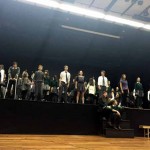Intercambios en curso
Por estos días nos visitan estudiantes extranjeros en el marco del Programa de Intercambios que no para de crecer, en especial, a partir de nuestra membresía en Round Square. Los estudiantes que están entre nosotros son de los siguientes colegios miembros de la Asociación: Emma Willard (ubicado en las afueras de NY), The Athenian (San Francisco), Felsted, UK, y la International Community School (ICS) Zurich, de Suiza.
El Emma Willard tiene un blog especial donde las alumnas en intercambio cuentan sus experiencias. Pueden ver la reseña completa de lo que han volcado hasta ahora Kiyo, Molly y Olivia sobre su estadía en Buenos Aires, aquí. Compartimos, además, algunos párrafos destacados sobre temas específicos:
Paro de transporte y clases en BDS: «Today there was a strike. All the public transportation was shut down and the workers went on strike and blocked off roads. That meant that some teachers and students weren’t able to come to school. The geography teacher was one of those unable to come (…) Math was very hard to understand because the teacher spoke really fast, but what they were learning I had already learned, so I was able to keep up. Chemistry was much easier to understand because the teacher talked slower(…)»
Política nacional e internacional: «Today was a regular Wednesday for Mechi (my host sister) but a very different Wednesday for me! I went to her Formacion Etica y Ciudadana class (FEYC), where we learned about the Argentine government system and constitution. I was also able to go to a Foreign Affairs class, which was very interesting because I had the opportunity to hear a very different viewpoint from those typically heard in the United States. I was also able to give my opinion and the opinion that is often presented in American media...»
Ensayo del play «13»: «...On Friday, we had school and after school Olivia, Kiyo, and I had to stay as our exchange partners all had play practice. At Belgrano Day School, everyone is in the play and everyone wants to be a part of it. We watched their rehearsal and they were very good. The play, which is called “13”, is in English so we had no trouble following along. After rehearsal, there was a party for everyone in the play and the 3 of us were invited as well. It was very fun and there was a lot of dancing«.
«Perlas» idiomáticas: » (…) no amount of time in the classroom or studying books can totally prepare a person for complete immersion. The biggest difference that I have noticed is the use of colloquial terms that I have never heard, and words that have a certain «textbook» meaning, but completely different meaning in actual practice. For example, the word «re» is used quite regularly here, in place of the word «muy,» or any other word that typically means «very.» For the first few days, I had no idea why everyone was saying a particular lecture was «re aburrido» (very boring) or why something was «reeee bien» (very good). Finally someone explained it to me, and now I even use it sometimes. Another word that is used very often is «tipo.» Here, «tipo» does not mean «type» but rather «like». Just as Americans (especially teenagers) use the word «like» often, «tipo» is used with incredible frequency and has a variety of meanings, some of which I still have to master.»








